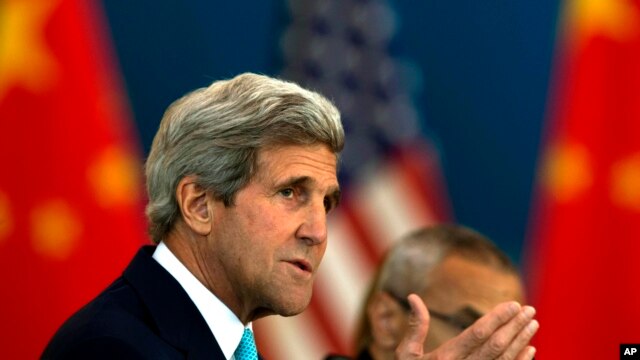
U.S. Secretary of State John Kerry speaks at the Strategic Dialogue expanded meeting with Chinese officials, July 10, 2014.
KABUL —
U.S. Secretary of State John Kerry arrived early Friday in Afghanistan's capital, where he'll try to resolve a deepening crisis over a disputed presidential election that has stirred ethnic tensions in the fragile country.
Returning from a diplomatic visit to China, Kerry plans to meet Friday in Kabul with the two leading candidates, Abdullah Abdullah and Ashraf Ghani.
Kerry will convey President Barack Obama's message that the United States expects "a thorough review of all reasonable allegations of fraud and ... will not accept any extra-constitutional measures," the State Department said in a statement.
Kerry already has warned Abdullah against using extra-legal means to grab power after his running mate talked about setting up a parallel government.
Preliminary results from the June 14 second-round run-off put Ghani, a former World Bank official, in the lead to replace outgoing President Hamid Karzai. Abdullah, trailing by about 1 million votes, has rejected the count and his aides have threatened to set up an alternative administration.
The United States says it does not take sides in the election, but does support a credible transparent process.
Ghani's camp, confident of victory, is wary of Kerry's mediation efforts, while Abdullah, who has alleged widespread fraud in the vote, welcomes the initiative.
Leverage uncertain
The United States, Afghanistan's biggest foreign donor, is in the process of withdrawing its forces from the country after 12 years of fighting Taliban insurgents, and it is unclear what leverage Kerry would have in resolving deep-seated rivalries.
Abdullah's camp, angry with Ghani's lead in the vote, has threatened to announce its own parallel government, a dangerous prospect for Afghanistan, already split along ethnic lines.
In a clear warning to Abdullah, Kerry said this week Washington would withdraw financial and security support if anyone tried to take power illegally. That would be a massive blow, given about 90 percent of the Afghan budget comes from foreign aid.
Speaking to reporters at the end of annual high-level U.S.-China talks, Kerry made no mention of the pending Kabul trip but said he had discussed the situation with all sides.
"I have been in touch several times with both candidates, as well as President Karzai," he said in Beijing. "We would encourage both for them to not raise expectations with their supporters, to publicly demonstrate respect for the accountability process and also to show critical statesmanship and leadership at a time when Afghanistan obviously needs it."
Candidate delays
Abdullah has put off announcing his government until after Kerry's visit. His camp welcomes U.S. involvement, hoping it could help pressure election officials into throwing out suspicious votes and thus change the race's outcome.
Abdullah has accused the outgoing president, who has an uneasy relationship with the United States, of backing Ghani and playing a role in rigging the vote.
"His Excellency John Kerry is coming ... so we welcome any effort to differentiate between clean votes and invalid votes," said Haji Mohammad Mohaqiq, Abdullah's second vice president and the leader of Afghanistan's ethnic Hazara minority. "I don't say that they should interfere, but they should cooperate in transparency. They should provide us political and
technical support," he told Reuters at his vast house in Kabul.
Bitter standoff
U.S. support is crucial for Afghanistan, which depends on foreign donors to fund everything from road-building to teachers' salaries and security, with Washington paying the lion's share of the bill.
President Barack Obama and Kerry have spoken to both candidates to encourage them to find a compromise and stop the country sliding into further political chaos.
"The goal is to help the parties find a way forward that ensures that the next president of Afghanistan has a credible mandate to lead a unified Afghanistan," State Department spokeswoman Jen Psaki told Reuters.
"The United States has made clear that our preference is to continue our strong support and assistance to Afghanistan and the Afghan people, but if the leaders of Afghanistan are unwilling to abide by their own constitution, that could impact the kind of financial and security assistance the United States provides."
Review expected
The White House has added, however, it expects "a thorough review of all reasonable allegations of fraud to ensure a credible electoral process".
Former U.S. special envoy for Afghanistan James Dobbins, in an address to the Asia Society in Washington on Wednesday, said Obama had spoken to both candidates. He said the president "assured them that Secretary Kerry would be arriving for discussions with them at the end of this week; and cautioned in particular Dr. Abdullah about moving pre-emptively in an unconstitutional fashion."
Abdullah, a former anti-Taliban resistance fighter, draws his support mainly from the Tajik minority in northern Afghanistan. Ghani, a former World Bank economist, represents Pashtun tribes in the south and east of the country.
Abdullah's refusal to accept the outcome of the vote has created a deadlock in Afghanistan, threatening to split the country along ethnic lines and setting the stage for a possibly bloody standoff or even secession in parts of the country.
The lack of political unity in Afghanistan has prompted observers to draw parallels with Iraq, where a one-sided government has failed to represent all parts of the political spectrum, weakening the country and allowing an al-Qaida offshoot to capture large swathes of Iraq in recent weeks. |
|
